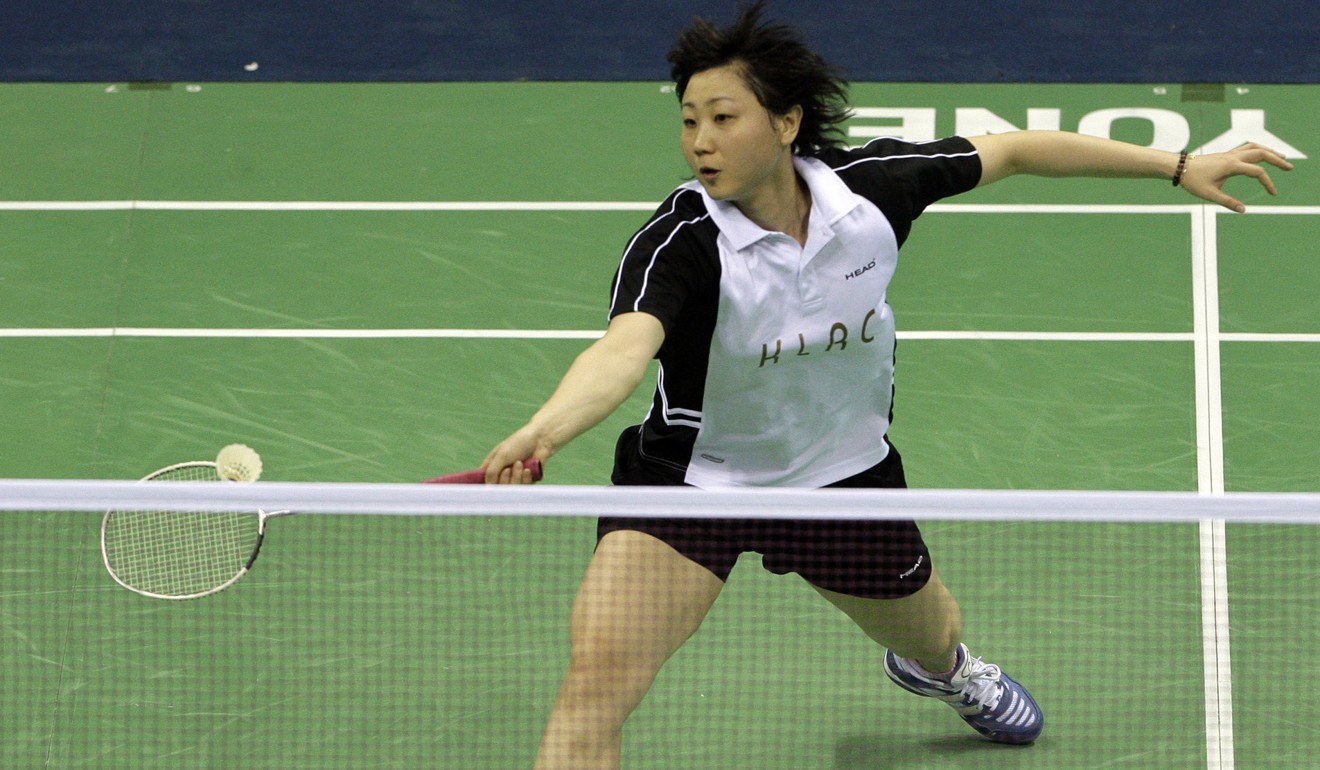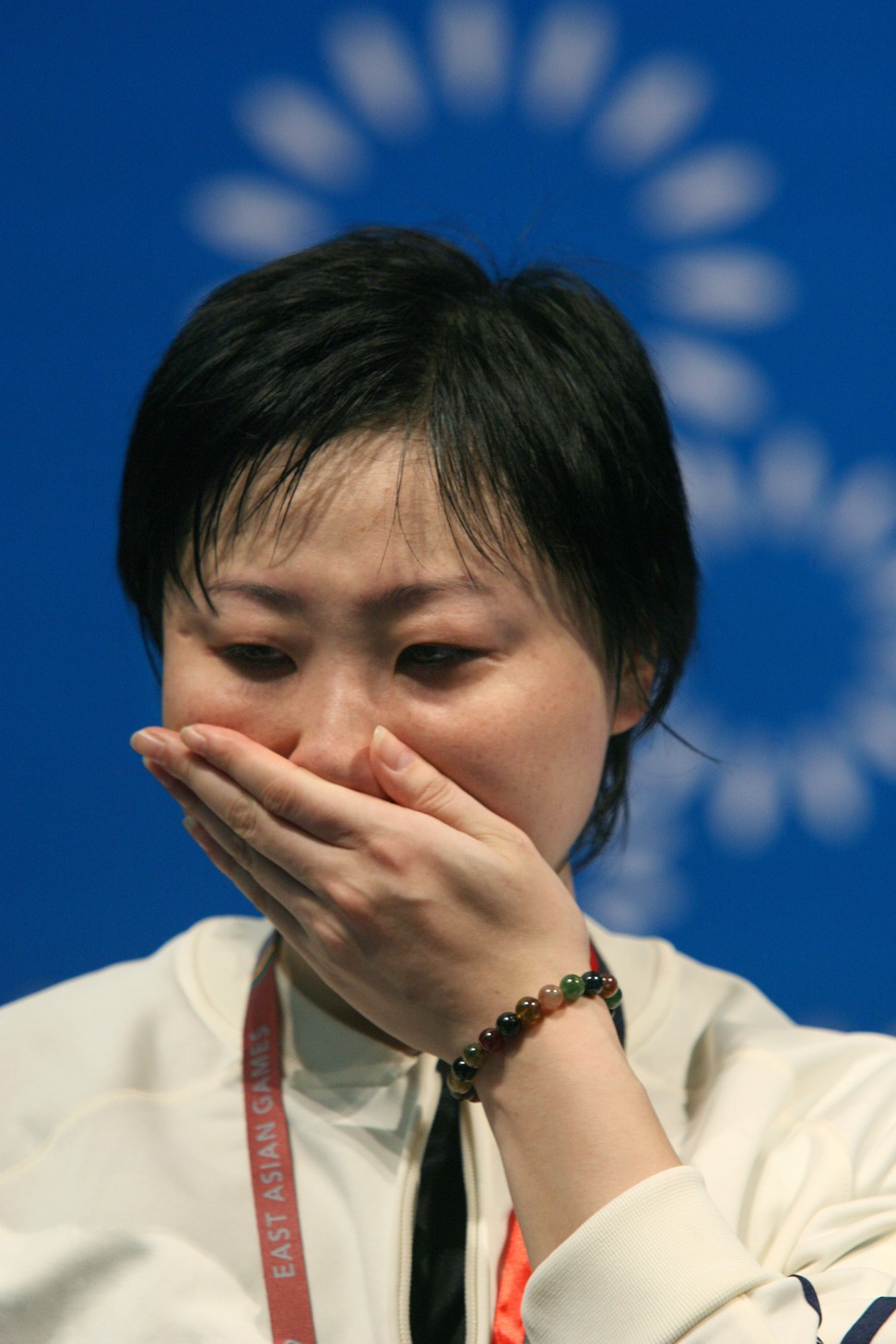
Unfair or unjust? Former Hong Kong badminton star Zhou Mi got a raw deal for failing a drugs test
- Athens Olympics bronze medallist was punished for testing positive for clenbuterol in 2010 while Thai player Ratchanok managed to escape punishment for the taking the same substance in April
- Hong Kong team coach Tim furious that badminton’s governing body has shown double standards by not punishing the Thai star
Thailand’s Ratchanok Intanon, a former women’s singles world champion and now world number five, failed a dope test in April. She was never punished.
It was a different story for Hong Kong’s former world number one Zhou Mi, though. Zhou was suspended for two years in 2010 after testing positive for the same banned substance.
Hong Kong team head coach Tim He Yiming is still furious.
“If a player has broken the rules, she has to take responsibility regardless of the reasons,” said He, who accompanied Zhou to a hearing by the world governing body in Denmark in 2010. “That’s what we were told at the hearing but apparently the Thai player’s case shows there is a double standard by the world body.

“Zhou also [like the Thai player] claimed she had mistakenly taken the banned substance and was given a two-year ban but there was nothing, no penalty at all for the Thai player. What else can we say?
“Maybe Hong Kong is a small city and not strong enough in badminton to get fair treatment.”
In the clear: Tearful Thailand badminton star Ratchanok Intanon ready for Olympic Games after doping ruling
In April, 24-year-old Ratchanok, who won the world title in Guangzhou in 2013 and was once hailed as one of the most talented players in the world, took an out-of-competition doping test in Bangkok. Her urine samples, both A and B, showed the presence of clenbuterol, which is listed under “S1.2 other anabolic agents” on the World Anti-Doping Agency (Wada) prohibited list.

The same banned substance was also found in an out-of-competition test for Hong Kong’s Zhou in June 2010. The 2004 Athens Games bronze medallist – when representing China – was banned for two years after a hearing in Denmark, the first badminton player to be suspended because of doping.
Clenbuterol is a performance-enhancing substance that helps to increase lean muscle mass and reduce body fat, according to the US Anti-doping Agency. In some countries, clenbuterol is used to promote muscle mass and meat yield in the cattle, lamb, poultry and swine industries. Such use is illegal in the US and many parts of the world, but reports indicate that it does occur in places such as China, Mexico and Guatemala.

Ratchanok was later charged by the Badminton World Federation (BWF) for violating article 2.1 of its anti-doping regulations. But after providing written submissions to a three-member panel in June, it was deemed that the Thai player bore no fault nor negligence and therefore escaped punishment.
What is clenbuterol and why are so many athletes testing positive? CrossFit veteran latest to be investigated for PED
In a nutshell, Ratchanok said the only plausible explanation for her positive test was the consumption of contaminated meat. She was tested on April 4, 2019 and no clenbuterol was found in her sample and when she was tested again on April 18, there was low concentration of clenbuterol found at an estimated concentration of 0.04 ng/ml, which is below the Wada’s Minimum Required Performance Levels (MRPL) of 0.2 ng/ml.
She argued that she frequently ate at a restaurant near her home in Bangkok and was able to provide reports that confirmed the presence of clenbuterol in the meat samples taken in July from that restaurant and therefore proved that clenbuterol entered her system through the ingestion of contaminated meat.

Thailand is not considered by Wada a high-risk country for food contamination. Therefore, there is no reason for her to take extra precautions when eating meat in the country.
Ratchanok said she had no intent to cheat. To benefit from the performance-enhancing effects, athletes need to consume clenbuterol once or twice a day over a lengthy period. The negative result on April 4 showed she was not a repeat offender.
Zhou, who qualified to represent Hong Kong under the government’s Quality Migrant Admission Scheme in early 2007, was not as fortunate. She did not know the concentration level of clenbuterol in her sample until a year later, when it was revealed to be similar to that of Ratchanok’s – 0.05-0.1 ng/ml.
She held a press conference with the support of a sports scientist that such a low concentration of clenbuterol does nothing to enhance performance. She said she was innocent, claiming she bought “pork and pork bone” for congee and soup and that this was the cause of her positive result. Unlike Ratchanok, though, Zhou was unable to prove the meat was contaminated.

Even if she had, it was too late to appeal her ban because it had been more than a year since her suspension started. After the ban was imposed, Zhou returned to the mainland to stay in her province of Guangxi where she got married. She now has two children.
The incident sent a strong warning to Hong Kong athletes because many of them spend time at training camps and at competitions on the mainland, where the consumption of pork or meat-related food products is unavoidable.
The Hong Kong Anti-Doping Committee (HKADC) advises athletes to avoid eating cattle and pig offal such as lung, liver and kidney and other parts where clenbuterol tends to accumulate. They also urge athletes to buy meat and food from reputable stores or restaurants.

Yvonne Yuan Wai-yi, who was the head of the HKADC during Zhou’s incident, said it was difficult to compare the two cases because Wada reviews its policy on regularly. “Zhou may consider herself unlucky compared to Ratchanok’s case,” said Yuan. “But Wada states very clearly that athletes have to take full responsibility for what they have ingested. They still face sanctions if they cannot prove they are innocent, even if in the case of inadvertent doping.
“Clenbuterol cannot be produced by the human body and once it is found in the system, it must be taken from outside whether it is unintentionally or because of doping purpose. That's why Wada has taken a no-threshold policy towards this banned substance.”
Coach He said he still kept in contact with Zhou and was told her daughters are talented badminton players. Maybe one day one of the youngsters can return to Hong Kong and defend her mother’s name on the badminton court.

